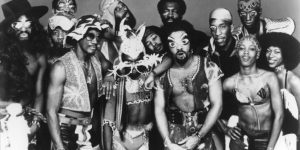CRAM SESSION: An intro to the prolific pop genius of Guided By Voices
by Jarrett Evan Samson
June 22, 2016
Guided By Voices' Robert Pollard has written over 1,600 songs. Here are some of the best.
Robert Pollard is a man possessed — he’s Guided by Voices (GROAN). The story of Pollard’s eventual rise into the realm of independent music’s most respected tunesmiths is a well-thumbed one in the ‘Indie’ chapter of rock history: A Dayton, Ohio schoolteacher who refuses to give up on his dreams, taking out loans to finance his own music alongside a few friends who recognized true talent when they saw it.
Bob Pollard, teaching classes during the week and playing small clubs on the weekends, swigging beer at a rate that would kill a lesser man and somehow finding time to write songs and melodies that seem conjured out of some collective consciousness. For many, this culminated in 1994’s Bee Thousand, a revelatory blast from the far out crops of Pollard’s endless musical fields.
There’s the flipside to this almost classical tale, too: Pollard may be just as legendary for the sheer amount of records issued under his name as well as various side projects on a seemingly hourly basis. “If only he edited himself,” his critics would say, ignoring or letting his records pile up in the ‘to be listened’ stack, taken for granted and written off as inessential. And therein lies the real truth of the person, not the myth, of Robert Pollard: this is a man not interested in what you think of his output, and whose various side projects belie the vast array of styles, genre experiments, and hidden successes that his career represent.
Guided By Voices perform at Calgary’s Sled Island music festival on the Olympic Plaza main stage on Saturday, June 25th. Read on for an introduction to the prolific pop genius of Robert Pollard and co.
Vampire On Titus (1993)
In the early years there were always two sides to the Guided by Voices coin: the sweet melodies and timeless songwriting, and the almost unlistenable scum laid overtop. Nowhere do these two tendencies meet quite like on 1993’s Vampire on Titus.
With a sound that hits your ears like the album is being played on blown-out speakers reverberating through the earth at some great distance from where you are, the strange arrangements and lo-fi buzz smother an album of all-time Pollard classics, front to back. From the electric-charge that packs “Sot” through to the evil nursery rhyme of closer “Non-Absorbing”, this album represents the perfect challenge to see if you’re up to Pollard’s walks on the wild side.
Alien Lanes (1995)
Guided by Voices’ first album for Matador, and the first one they made KNOWING someone would be listening to it, eclipses Bee Thousand in sheer perfection and purity of vision. A 28-song(!) album, there isn’t a hair out of place, every song serving the album to the point any exclusion would collapse the whole tower. Case in point: “(I Wanna Be A) Dumbcharger” is the sacrificed pawn, laid out on the board to lower your guard before the immortal “Game of Pricks” puts you in eternal checkmate.
Alien Lanes also finds Pollard at his height of tempering beauty with reckless abandon on “Ex-Supermodel” which features some intense snoring laid HIGH in the mix. This album is also notable for featuring some of guitarist Tobin Sprout’s best songs for the band in “A Good Flying Bird” and “Little Whirl”.
Static Airplane Jive (1997)
GBV’s 7” EPs are exactly what that format should be — experiments in the formula where things get a little weird. From Clown Prince of the Menthol Trailer to Fast Japanese Spin Cycle to Get out of my Stations, the EPs of the era show other sides of the GBV songbook from beauty to pure outlandish novelty.
Static Airplane Jive balances the formula perfectly by featuring some of the band’s finest gems (“Big School”, “Gelatin Ice Cream Plum…”) alongside its most outlandish (“Hey Aardvark”, “Damn Good Mr Jam”) in a little over 10 minutes.
Robert Pollard – Not In My Airforce (1996)
Pollard’s first solo album, released on the heels of the last ‘classic line-up’ Guided by Voices record Under The Bushes Under The Stars, is the first and brightest evidence that his solo projects and side diversions are often Pollard’s overlooked heights.
A melancholic, contemplative record even at its rollicking heights (“Maggie Turns to Flies”, “Flat Beauty”) also contains some of the saddest songs Pollard ever wrote — “Quicksilver”, a duet with Chavez/Bonnie Prince Billy/ex-GBV bandmate Matt Sweeney, and the devastating “Release the Sunbird” — might make you reach for a tissue or a razor.
Not In My Airforce is also notable for its bizarre yet effective sequencing, with most-obvious-album-closer-in-the-world “Psychic Pilot Clocks Out” (“I feel life passing on by us”) instead dissolving into a seven-song suite of mostly acoustic minute-long weepers that is both baffling and amazingly perfect.
Robert Pollard with Doug Gillard – Speak Kindly of Your Volunteer Fire Department (1999)
Long used as argument 1 for the worthiness of digging into the extended Pollard catalogue, Speak Kindly… deserves all that praise and then some, standing its own against better-known classics in the battle for Pollard’s finest release.
Opener “Frequent Weaver Who Burns” sets the pace with a mid-tempo pop ballad featuring some quintessential indecipherable Pollard lyrics (“pagan shudders described at shrine / dark skins large elephantine”) and the album only picks up steam from there. A perfect record featuring a broad range of styles, this album proves Doug Gillard’s role as Pollard’s perfect musical foil and shows off a wide range of the pair’s influences and strengths. Long overdue for a reissue.
Universal Truths and Cycles (2002)
GBV’s first album back with Matador after a two-album stint with TVT finds Pollard’s pop songwriting melding with his prog tendencies to a great and effective balance on this underrated album, a perfect fusion of Alien Lanes-era songwriting and Isolation Drills’ elevated production values. Songs like “Father Sgt Xmas Card” and “Skin Parade” continue to show Pollard’s experimental leanings while “Back to the Lake” and “Pretty Bombs” provide the sweet pop balance.
Robert Pollard – From A Compound Eye (2006)
Pollard’s first record to be released following the first ‘breakup’ of Guided by Voices is a 2LP proggy affair that shows him stretching out and taking full advantage of the freedom his own name can provide. From A Compound Eye feels like the longest-gestating Pollard album, thought out and perfected, every corner sanded to exacting standards.
Pollard, working with longtime recording partner Todd Tobias, seems to be relishing in the freedom a solo album provides, moving from the heartbreaking beauty of songs like “U.S Mustard Company” to the Meatloaf/Gentle Giant mash of “Conqueror of the Moon” while leaving room for multiple pit-stops into outlandish experimentation and rock ‘n’ roll glory. On top of it all, “Dancing Girls and Dancing Men” and “I’m a Strong Lion” might just be two of the best earworms in the entire Pollard catalogue.
Keene Brothers – Blues and Boogie Shoes (2006)
Pollard’s record with respected power-pop-pop-popper Tommy Keene (also a member of Pollard’s live band for a time) is an absolute blast of perfect pop music from start to end. Pollard’s vocals are at their arena-rock high as he hits every note with ease in what may just be his finest vocal performance laid to tape. Keene, who handled the album’s instrumentation, matches Pollard’s efforts with every guitar hook, crunching chord, and pounding drum.
Motivational Jumpsuit (2014)
When the ‘classic’ line-up GBV reunion was announced it seemed like an impossible task had been achieved, and yet the band then went above and beyond by announcing this was no mere classics cash grab but a brand new dawn. Post-reformation Guided by Voices released four albums in a little over a year, which is insane (INSANE), but the reformed GBV found their stride on 2014’s penultimate (for this era, anyways) Motivational Jumpsuit.
A record that feels both immediate and incredibly thought out, almost every song transitions into the next, 20 songs coming in two-minute chunks without a second to catch your breath. Tempered by some of Tobin Sprout’s best of the reunion era (the melancholia-pop of “Jupiter Spin” and “Record Level Love” and the sheer heartbreak of “Shine”), the album seems to be the most self-aware album of Pollard’s career.
Motivational Jumpsuit ends with sad acoustic lo-fi ballad “Evangeline Dandelion” ending in a comical pop of applause before the rousing “Alex and the Omegas” and its Bob-By-Numbers lyrical cycle brings the album to a close. Overlooked and underrated, Motivational Jumpsuit proved there was a lot of juice left in the tank.
This article also holds a direct and incredibly personal note for myself. On a snowy (!) Vancouver night in March 2002 at Richards on Richards, 18-year-old Me would successfully get through security and have my life changed forever. This would lead to years of spending all my money seeing GBV and Pollard solo around the world, including a memorable Dayton, Ohio show and the first ‘Electrifying Conclusion’ in Chicago (where I would witness John Cusack dejectedly eating a square of pizza, but that’s a story for another day).
Fourteen years later, on the verge of my 42nd time seeing Robert Pollard live at this year’s Sled Island festival in Calgary, I can say with certainty that my life would be vastly different than if I had been turned away that night. Robert Pollard inspired me to create. He defined and expanded my tastes, taught me that it’s better late than never, helped me meet friends, some of whom I play music with to this day. Robert Pollard taught me the power of music, the power of determination, and how important it is to make art, first and foremost, for yourself.
In Bob We Trust.
Tags: Music, Featured, Lists, cram session, Guided By Voices, robert pollard





